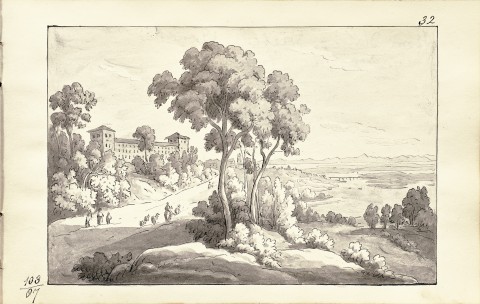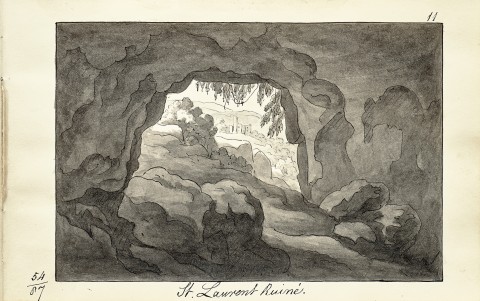SKETCHBOOK OF VIEWS IN ITALY, c.1849
JOHN RICHARDSON GLOVER
bound sketchbook with 39 sketches
pencil, pen, ink and wash on paper
12.0 x 19.0 cm (sheet, each) 13.5 x 19.5 cm (book)
34 sketches are numbered and inscribed with title
Private collection, Tasmania, acquired c.1850s
Thence by descent
Private collection, Tasmania
on short term loan to Queen Victoria Museum Launceston, Tasmania, for the purposes of research, 1977
on short term loan to the Australian National Gallery, Canberra, for the purposes of research, 1981 – 82
on short term loan to the Tasmanian Museum and Art Gallery, Tasmania, for the purposes of research, 2000
John Glover, (Sketchbook no. 87: Italy), 1818, pencil, pen, ink and wash, 18.1 x 11.8 cm, in the collection of the Tasmanian Museum and Art Gallery, Hobart, illus. in Hansen, D., John Glover and the Colonial Picturesque, Tasmanian Museum and Art Gallery, Hobart, 2003, p. 253
We are grateful to Jane Stewart, Principal Curator of Art for the Tasmanian Museum and Gallery, for her assistance with this catalogue essay.
When the eminent landscape artist John Glover emigrated from England to Van Diemen’s Land, he was accompanied by his wife and eldest son, John Richardson Glover.1 He was sixty-four; John Richardson forty-one. Arriving in Hobart Town in April 1831, they were reunited with his three other sons, who had begun farming on palawa land two years earlier. In 1832 John was granted land by the Nile River in northern Tasmania where they built their house Patterdale. Here he re-established his painting practice, ably supported by John Richardson as studio assistant and farmer. As we know well, John became Tasmania’s most renowned colonial landscape artist. An art teacher in England, John Richardson’s own artistic output in Van Diemen’s Land was limited, and he is best known now for pen and wash drawings recording local buildings and letters describing of their life and activities, significant documents about colonial Tasmanian settlement.
This small sketchbook draws upon the talents and activities of both artists. It is one of the extant examples showing John Richardson’s close artistic relationship with his father, and the vital role that sketching, copying and re-using earlier visual records played before the development of photography. The book contains thirty-nine (previously forty-four) small monochromatic landscapes – the features outlined in pen and ink and enhanced with even tonal washes, which evoke the atmosphere and luminosity of the Italian vistas depicted. A hand-written index, titled Views in Italy, provides locations for the topographical vistas: St Peter’s in Rome, Lake Nemi, the Taro River, Suza and so on.2
Yet John Richardson is not known to have visited Italy. Instead, the numbers at the lower left of each drawing correspond with sketches in one of the 104 sketchbooks John had brought with him to Van Diemen’s Land. John is known to have been an inveterate sketcher and traveller, often fitting multiple sketches per page. His pupil Edward Price wrote: ‘His knowledge was almost entirely derived from the Study of Nature and not from Works of Art. His numerous Sketchbooks are full of Indian Ink drawings made at all hours… Nothing escaped his observation and he never lost an opportunity of noting down anything that was worth remembering.’3 During 1818 John had travelled to Italy, seeing in the flesh picturesque views and edifices that he would have previously only studied in engravings and other tourists’ art. His only surviving Italian sketchbook, Sketchbook 87, is held by the Tasmanian Museum and Art Gallery, Hobart and records some of the evocative landscapes, churches and Roman ruins that he had seen. It is well known that John called upon his sketchbooks throughout his life: in 1835 at Patterdale, for example, he painted My last view of Italy, looking from the Alps over Suza (Art Gallery of New South Wales).
Upon John’s death in 1849, his sketchbooks were distributed between his three surviving sons. Sketchbook 87 was given to John Richardson, and he selected forty-four views to copy for his, or another’s, further use, possibly before sale.4 A Whatman watermark, dated 1849, shows that the sketchbook was made no earlier than the year of John’s death.
1. Contemporary statements suggest that debts accrued by John Richardson influenced their move.
2. Sketches numbered 5 – 8 and 12 are now missing from the book.
3. Edward Price, quoted in David Hansen (ed.), John Glover and the Colonial Picturesque, Tasmanian Museum and Art Gallery, Hobart, 2003, p. 44
4. Hansen, ibid., p. 264
ALISA BUNBURY


